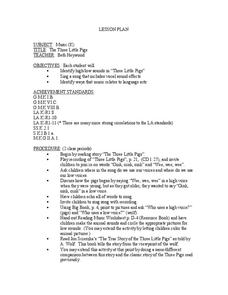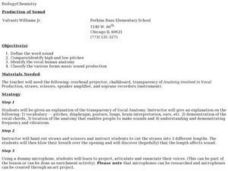Curated OER
Sounds Great
Students examine the types of sounds sculptures make. They create their own sculpture that make sound using everyday materials.
Curated OER
Manipulate Sound Waves
First graders use the scientific process to investigate sound in the classroom and at home. They participate in several hands-on activities exploring sound. They then are introduced to sound vocabulary such as muffled, sharp, and tinkling.
Curated OER
Sound
Second graders investigate the production of sound through experimentation. Working in pairs, 2nd graders receive supplies to create a sound machine. Once they create their machine and record the differences in the sounds produced.
Curated OER
Sound
Second graders answer the question "What is a sound system?" They investigate sound systems and explain how sound is produced. Students visit the sound museum and at each station they predict how sound is made. They construct a simple...
Curated OER
Sounds Like Science - Guitars
Students discover that all movement produces sound waves but not all sounds can be heard with the human ear. They experiment with a variety of substances to see which are audible and which are inaudible.
Curated OER
Science, Sounds And Hearing
Middle schoolers examine various sounds that are played on musical instruments. They conduct an experiment to listening to different instruments. They define significant vocabulary like "vibration" and "oscillation". Students suggest...
Curated OER
Vibration and Pitch
Fifth graders investigate the relation between vibrations and pitch. They observe and discuss an experiment involving a bicycle and a piece of cardboard in the spokes, listen to a comb with cardboard, and listen to various sounds and...
Curated OER
Tuned in: Tuning Forks and Sine waves
Students explore the characteristics of a pure sound wave produced by a tuning fork. They use sine waves to find a curve to fit the sound wave data produced by the tuning fork. A CBL and microphone is required for this activity.
Curated OER
Loudspeaker
Students study the different types of loudspeakers and how they work. In this sound activity students create their own loudspeakers.
Curated OER
Lesson 3-Explore/Explain Do You Hear What I Hear?
Students explore how loudness is measured. They identify the decibel scale and explain the amplitude of the sound wave.
Curated OER
ABC Scavenger Map
Students explore phonetics by participating in a class game. In this alphabet sounds lesson, students collaborate in a ABC's activity where they identify a random letter, the sound it makes, and place it in it's correct spot on a mat....
Curated OER
Here's the Pitch
Students define pitch, measure varying amounts of water into containers, make predictions about the sounds made when striking the containers, put containers in order from highest to lowest pitch, and create their own sound patterns with...
Curated OER
Sizing Up Sound
Sixth graders are introduced to the concepts of sound waves and frequency. As a class, they listen to the differences between different types of instruments. To end the lesson, they practice identifying low and high pitches and playing...
Curated OER
Fifth Grade Lesson Plan
Fifth graders analyze and practice the musical concept tone color. They assess how the quality of a sound is affected by the material, shape and size of the source. Each student determines whether a passage is performed in a high or low...
Curated OER
Responding Syllables: Reading and Music
Shell Silverstein’s “Sick” provides an opportunity for kids to demonstrate their understanding of syllables and phonemes. The class creates a list of descriptive words used in the poem that have more than one syllable, and brainstorm how...
Curated OER
Animal Challenge 2
For this pitch worksheet, learners examine a list of 6 animals. Students record the size of each animal as big or small and the sounds they make as high or low.
Curated OER
The Three Little Pigs
Students identify high and low sounds in the "Three Little Pigs" song, sing a song that includes vocal sound effects and identify ways that music relates to language arts. Before singing the song, they have listened to the teacher read...
Curated OER
Perfect Pitch
In this pitch worksheet, learners make sounds using rubbing alcohol and soda bottles. Students follow 4 sets of directions and answer 4 questions.
Curated OER
Archeologists For a Day
Learners listen to a reading about fossils and go on a hunt for items with fossil characteristics. In this cross curricular fossil lesson, students will examine their fossil finds and create a graphic organizer. Learners...
Curated OER
Vocal Exploration
Students explore vocal anatomy. In this biology/music lesson, students first learn vocabulary associated with the voice and body. They then use straws, microphones and recorders to differentiate between high and low pitches and...
Simon & Schuster
Curriculum Guide: The Scarlet Letter
The Scarlet Letter may be a classic, but keeping high schoolers engaged in the reading of Hawthorne's vocabulary, syntax, imagery, and historical references presents it own set of challenges. Here's a guide that offers readers...
Curated OER
Now Hear This!
Students observe the differences between low- and high-frequency sounds. They research and compare the characteristics of various animals that rely on infrasonic sounds to communicate.
Curated OER
The Case of the Electrical Mystery
In this electrical mystery worksheet, students watch a television broadcast called "The Case of the Electrical Mystery". They answer 8 questions about how detectives solve problems presented in the segments. Topics include hypothesizing,...
Curated OER
Musical Mountain
Pupils listen to low, middle, and high pitches of music and identify if they are low, middle, or high. In this musical pitch lesson plan, students visually see low, middle, and high pitches on a mountain.























